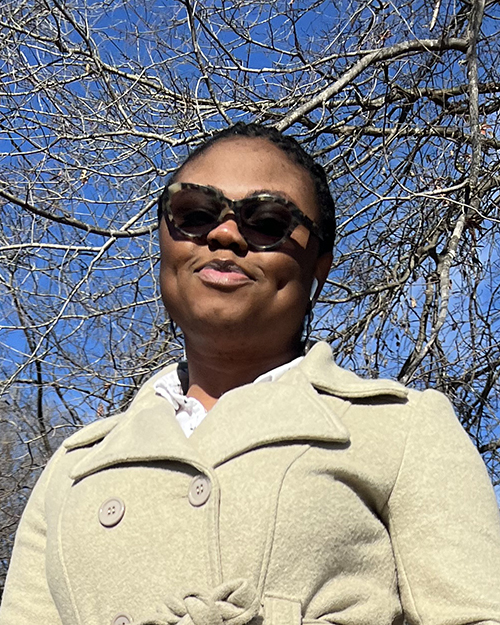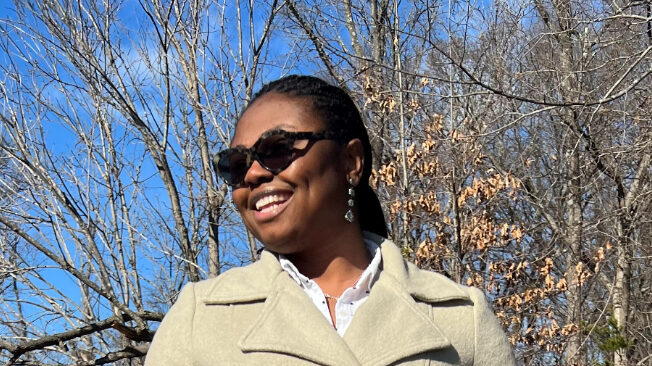My parents have been a strong influence on me in so many ways. They are givers! Growing up, we used to have a lot of people live with us, and I saw how they did everything to ensure that everyone was comfortable.
— Stephanie Hassan, M.A. PCS Student
They gave their time, resources, and everything to ensure that my siblings and I, and every person who passed through our house, had a good education and all that we needed to succeed in life.
The act of giving is one of the many characters that I’ve learned from my parents, and I hope to fashion my life in this regard.”
INTERVIEW WITH STEPHANIE HASSAN

DOUGLAS P. FRY: WHAT PEOPLE HAVE HAD STRONG INFLUENCE IN YOUR LIFE?
Stephanie Hassan: Well, my parents of course, in teaching me to value education and to be generous. Another person is a very close friend of mine, Taiwo. He’s been a very strong influence on me and has always pushed me to be a better version of myself, to do better at my studies. He was very influential in encouraging my move to the United States for graduate studies.
DPF: WHAT VALUES ARE MOST IMPORTANT TO YOU?
SH: For me, I would say loyalty. Loyalty is very important to me. I am very loyal person, and I expect that same loyalty back. Integrity too is very important for me. Integrity, they say is doing what you say and saying what you do, so whatever you say must be what you do and whatever you practice must be what you preach.
DPF: HOW DOES IT FEEL TO STUDY IN A CULTURE VERY DIFFERENT FROM YOUR OWN?
SH: Upon my arrival, from Nigeria to study at UNCG I experienced a very huge cultural shock that I am still trying to recover from, while I have recovered from some of it.
One of the major cultural shocks was in terms of respect for older people. Where I come from, we were trained to not say some certain things to elders or in formal situations—there are ways you don’t address them.
For example, in my culture, I can’t address an older person by his first name. I see here in America that it’s such a free and relaxed society that you can address everybody by their first name in most unprofessional settings and even in some professional settings.
You see that happening so that’s one of the culture shocks that I first experienced when I got here. Another is in terms of how people dress, especially women, here in the United States.
The manner of dress was and still is a big cultural shock to me particularly during the summer. I wasn’t used to seeing people dress in a scanty manner, especially during the summer. It was a huge shock for me.
DPF: IS THE US SOCIETY (AND/OR NORTH CAROLINA) DIFFERENT FROM WHAT YOU EXPECTED?
SH: Yes and No. Why I’ll say no is that I really didn’t have much of an expectation as to what North Carolina was going to be like. For the United States in general, I would say it’s very different because I saw the United States from the lens of the movies and documentaries that we watched back home.
From these movies, we saw how glamorous and beautiful the nation is. Don’t get me wrong, it is a beautiful country. But it’s not the same as the movies show us.
This is the first time I’m traveling out of my country, and to be quite frank I didn’t have much of an expectation aside from what I had seen on TV. I just knew that whatever it is, I was going to be immersed in another culture and learn the ways of this new culture. So far, so good. It’s been a wonderful experience even though it’s very different in many ways from Nigeria
DPF: YOU HAVE FINISHED YOUR FIRST YEAR IN PCS. WHAT HAVE YOU LEARNED SO FAR IN TERMS OF SKILLS, PHILOSOPHY, KNOWLEDGE, AND PERSPECTIVE?
SH: I have learned that humans are not inherently evil. Going through Dr. Fry’s course on indigenous peacekeeping practices, my mind has changed: humanity is not inherently evil, the world doesn’t have to be upside down, we can actually attain peace, and we should start to think about ending all the wars and conflicts.
This is one major thing that I have learned among a host of others. Also, in the same course where we studied about indigenous peace practices, I learned the different methods and mechanisms by which these indigenous societies attained peace and remained peaceful.
It’s just so practical. We can apply these same principles in our personal lives to interpersonal conflicts around us. I also see the role of third-party mediation in the resolution of conflicts, and these are things I’m learning for the first time.
Even though my background is in journalism, I am learning new things, and it’s been an interesting ride for me so far.
In Dr. Hale’s class this semester, one very important thing I learned is that settled bodies can help settle other bodies, so collectively we can heal from past racial traumas.
DPF: DO YOU THINK THAT CONFLICT STUDIES CAN IMPROVE HOW PEOPLE GET ALONG WITH EACH OTHER?
SH: Absolutely! One of the things we learned about indigenous peacekeeping method and methodologies is something called “avoidance.” I live in an apartment with two other roommates that have been at loggerheads with each other from the get-go, and so I employ some of these lessons from the course which has helped me function effectively as a third-party mediator.
For instance, suggesting avoidance to both parties at some point was a mechanism that worked. So, I think that PCS can improve how people get along with each other because we are learning how to prevent conflicts, navigate conflict, and make sure conflict doesn’t end up becoming violent.
I also learned about positive peace and negative peace, and their distinctions.
DPF: DO YOU FIND THE US SOCIETY MORE DIVIDED THAN THE NIGERIAN SOCIETY?
SH: Nigeria is a very multi-cultural society. We have three major tribes and geopolitical zones. We are also a very tribalistic people, hence very divided. Now division in Nigeria is not just regarding politics, it is also over resources.
Even our soccer team in Nigeria can be a cause of division for us. The major area I see division in the United States is in terms of politics. Republicans and Democrats, and the policies. The division I see here is almost like a healthy competition between two opposing parties.
It usually doesn’t get violent, there’s no thuggery, no obvious “god-fatherism,” and all the things that pollute our politics back home in Nigeria. So even though the US is divided along the political line, the society is not torn apart due to this division.
DPF: DO YOU HAVE ANY THOUGHT ABOUT LIVING IN THE MULTICULTURAL SOCIETY?
SH: Multiculturalism is good. There is the beauty that comes with the diversity of a multicultural society. Of course, this synergy of people from different background comes with its challenges, especially in terms of conflict. However, there is a greater good beyond such conflicts. Look at the US for example. I believe one of the greatest strengths of the US is that people from all over the world, with different cultures and traditions, comprise the American people.
DPF: HOW DO YOU USE THE PEACE AND CONFLICT SKILLS AND KNOWLEDGE IN YOUR OWN LIFE, SUCH AS IN YOUR PERSONAL OR PROFESSIONAL SPHERE?
HS: I have been able to apply some of the methodologies that I learned from Peace and Conflict Studies, for instance with my roommates, to help maintain peace and make sure that conflict is prevented, and in situations where it can’t be prevented, to make sure conflict doesn’t escalate into violence.
Even in my personal life, I have been able to apply some of these principles. For example, when I have an issue with my spouse, I’m quick to remember these principles in dealing with some of these conflicts rather than letting them escalate into arguments.
DPF: WHAT ASPECTS OF NORTH CAROLINA DO YOU LIKE?
SH: Well so far, I’ll say I love the weather especially when I first came it wasn’t too hot, and it wasn’t too cold: it was just beautiful weather. We are not used to extreme cold.
However, I’m adjusting. Regarding the food, I’m not very experimental with food, so I can’t say much about that. Since I enjoy cooking, I make my meals myself. Another aspect of the culture that I love so much is the way people hold doors for each other. This is the first time I’m experiencing that, and to be honest, it’s not common where I come from.
DPF: WHAT ASPECTS DO YOU FIND CHALLENGING?
SH: The aspect I found challenging in the beginning was the accent. I grew up in the southwestern part of Nigeria with a mix of two different mother tongues, but I’m most fluent in Yoruba language.
A lot of times in the US, I had to repeat myself several times before people could understand me. Even when I go to the stores, I had to describe what I wanted to buy before they understood. With time, I’m understanding how to pronounce some of the words in a more Americanized way, and that has been very helpful for me.
DPF: MORE GENERALLY, WHAT ARE YOUR HOPES AND GOALS FOR THE FUTURE?
SH: One hope is to join the Peace Corps and apply the knowledge that I have learned to make the world a better place. Eventually, I want to invest my time and resources into starting a NGO that will promote peace and champion the eradication of wars in Africa, in particular, and the world, in general.
